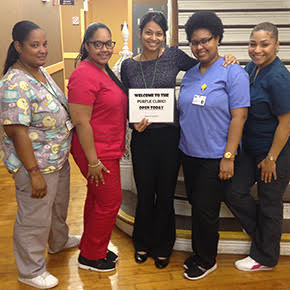Focus on a Provider: Dr. Anita Ravi
Anita Ravi, MD, MPH is a family physician engaged in clinical, research, and policy work focused on addressing the health care needs of marginalized populations, especially trauma-informed primary care interventions for populations involved in sexual coercion and violence. She recently started the PurpLE Clinic (Purpose: Listen and Engage), a safe health care clinic for anyone who has experienced sexual exploitation, selling sex, or trading sex to survive.
“My focus is the intersection of gender based violence, health, and the criminal justice system and how those interplay. As a family medicine resident, I had the opportunity to spend elective time at Rikers Island Correctional Facilities and volunteer as a health educator. In parallel, I learned about trafficking of persons in New York City and how the city handles these cases at a conference on domestic commercial sexual exploitation of minors. To better understand this issue, I spoke to 60-70 people from sectors such as law, social work, and medicine and shadowed lawyers at the Legal Aid Society to learn about the justice system and how prostitution-related charges were handled.
These experiences led to the design of the PurpLE Clinic, which opened at the Institute for Family Health on July 12, 2015. The patients we care for have very diverse experiences with sexual exploitation and related health care needs. On a recent Sunday, I met a family whose mother was seeking asylum to prevent her daughters from female genital cutting, a transgender trafficking survivor wanting to connect with health care due to side effects from non-prescribed hormone therapy, and a woman who was seeking contraceptive counseling and STI testing because her partner was sexually assaulting her. I can’t predict what each week will look like but I hope people are connecting with the health care they need.
I give the Institute for Family Health huge credit for their role in hosting the PurpLE Clinic. You can’t address trauma in 15 minutes, so to have the ability to give people extended appointments, in-house access to mental health care, team-based chronic disease management, and integrative medicine options such as acupuncture has been really great. While it is so exciting when patients come through the door, it also highlights challenges in providing care for patients who are justice-involved, undocumented, seeking asylum, or uninsured. Given the logistical barriers, it is great to have support of a mentor network to ask, ‘Was this the best care we could have offered?’ I have learned so much about our health care system and what needs to be changed to provide good health care for patients with these experiences.
The American Academy of Family Physicians says, ‘You can become your personal statement.’ I believe this to be true, particularly in family medicine. People have many reasons for going into medicine but can face difficulties pursuing their passion post residency. I have learned that every family medicine experience doesn’t look the same and just because your dream job doesn’t exist yet, doesn’t mean it can’t. Some days I can’t believe this is my job. I get to do things that I care about and I have had amazing mentors who have guided me towards believing that anything is possible!”

